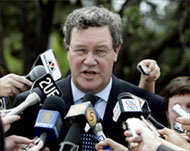Australian kickback inquiry takes toll
A scandal over Australia’s involvement in the Iraq oil-for-food programme is putting increasing pressure on the conservative government of John Howard, with calls for some of his senior ministers to resign.

According to a poll published in The Australian newspaper on Tuesday the prime minister’s popularity had slipped six percentage points in the two weeks of an inquiry into alleged kickbacks paid to the former Iraqi government of Saddam Hussein.
The poll came as Howard’s foreign minister, Alexander Downer, went before the inquiry where he denied seeing a string of diplomatic cables warning his government that the country’s monopoly wheat exporter was paying bribes to Saddam.
Downer is the second minister to appear at the inquiry into allegations that the Australian Wheat Board (AWB) paid A$180 million (US$220 million) to Baghdad to secure grain contracts worth more than A$1.9 billion under the UN’s oil-for-food programme.
Mark Vaile, the trade minister, has also denied knowing what was going on. Opposition figures have called on him to resign.
 |
|
Alexander Downer is the second |
In a written statement to the inquiry, made public as he took the stand, Downer repeatedly denied having seen the warnings sent by diplomats to Canberra about AWB’s possible corruption.
“I do not have a specific recollection of having received or read this cable or (it) otherwise being brought to my attention,” Downer wrote 21 times in his sworn statement about the cables.
Ratings down
Howard, a staunch US ally who sent 2,000 Australian troops to join the 2003 invasion of Iraq, is likely to be questioned under oath at the inquiry later this week, making him the first prime minister to appear at such an inquiry since 1983.
 |
|
Mark Vaile, the deputy prime |
He was due to send a written statement to the inquiry by Tuesday afternoon.
While retired judge Terence Cole, who is chairing the inquiry, is not due to publish his findings until June, political opponents and the media have criticised Vaile’s comments that he was too busy to pay attention to diplomats who sent warnings to Canberra about the alleged corruption.
Critics say the inquiry will hurt Howard’s conservative coalition administration.
|
“If he has any self respect he would resign over this matter; the negligence is so gross” Kevin Rudd, |
Kevin Rudd, the opposition Labour party’s foreign affairs spokesman, has called on Vaile to quit saying: “If he has any self respect he would resign over this matter; the negligence is so gross.”
Spider’s web
The AWB was not alone in allegedly paying kickbacks to the former Iraqi president.
In a damning report last year, Paul Volcker, the former US central banker, said about 2,200 companies and individuals were involved in corruption surrounding the oil-for-food programme.
The AWB, which until 1999 was government owned, was the biggest supplier of humanitarian goods to the programme, which was set up to help Iraqis cope with UN sanctions imposed after Iraq’s 1990 invasion of Kuwait.
According to testimony at the inquiry, diplomats and trade officials began warning government officials in 2000 that AWB might have been paying kickbacks, but both Downer and Vaile say they never got their messages.
When Vaile heard the rumours, he feared they may have come from an American wheat group, US Wheat Associates, which he said was lobbying to have the AWB scrapped as part of US-Australia free-trade talks.
“I recall thinking that that organisation was prepared to go to any lengths to weaken Australia’s position in negotiations,” Vaile said in his statement, adding that AWB executives had denied the charges and that the UN had approved AWB’s Iraqi contracts.